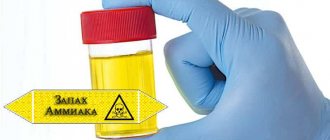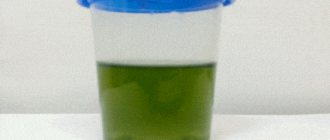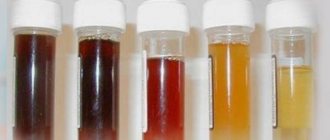Baby smells of urine
Normal urine in infants or older children is light yellow in color, its smell is unnoticeable, and if it exists, it is not strong. Under no circumstances can it smell like acetone, ammonia, or anything acidic. Sometimes, due to the consumption of certain foods (vegetables or brightly colored fruits, natural juices, fermented or fried foods), the characteristics of urine may change, but they quickly return to normal when the food is completely digested and the body removes metabolites.
If the smell or color of urine has changed and does not return to normal after 3-4 days, then you should be concerned about this and contact your pediatrician to find the reasons for the deviation.
Most often, normal diuresis is disrupted by the following factors:
- infections in the excretory system;
- vitamin D deficiency;
- diabetes;
- acetonemia;
- dehydration;
- poor nutrition.
The concept of norm
It is normal to have yellow or bright yellow urine. Depending on the food consumed, the color may become dark yellow or bright scarlet in the case of eating beets.
There is a clear dependence of the color of urine on the formed diet or the use of medications. However, odor is not expected.
You should sound the alarm if there is sediment or blood in the urine, which indicates a life-threatening and health-threatening disease. A pronounced unpleasant odor is also a warning sign.
If a child’s urine smells like ammonia, this is a reason to consult a doctor and perform a series of tests.
Infections of the excretory system
Pathogenic bacteria are especially dangerous for young children, as their body and immune system continue to get used to new living conditions outside the womb and are not yet able to repel attacks from microbes. The urinary system can be affected by bacteria, viruses and fungi. Most often they settle in the kidneys, bladder and urinary canal - urethra, causing pyelonephritis, cystitis and urethritis, respectively.
Pyelonephritis
Pyelonephritis is a nonspecific inflammatory process in the tissues of the kidneys, associated with damage to these organs by infection. In children, and especially in infants, the disease is acute, causing vivid symptoms.
The urine changes its color, becomes darker and richer, and acquires an unpleasant, pungent odor. The child has an elevated temperature (38–40 degrees) and a fever appears. In severe cases, febrile convulsions cannot be excluded.
Intoxication of the body provokes nausea and vomiting, upset stool, discoloration of the skin and mucous membranes, bad breath, dark circles under the eyes.
Pain in the lower abdomen and lower back often occurs. It is extremely difficult to identify this symptom in children, since they cannot accurately indicate the place that hurts and talk about pain “spread” throughout the abdomen. In addition, the baby constantly cries, sleeps poorly, refuses to eat, and loses weight without changing his diet. Children of conscious age develop irritability, hyperactivity, and tearfulness.
Cystitis
Cystitis is an inflammatory process affecting the mucous membranes of the bladder. It rarely develops as an independent disease; most often it is provoked by urethritis or pyelonephritis, as pathogenic microorganisms begin to spread down or up the excretory system. The symptoms of cystitis are not as acute as those of the previous disease:
- urine becomes dark yellow and has an unpleasant odor;
- urination becomes rare or frequent;
- the baby's sleep is deteriorating, he is whiny and irritable;
- Painful sensations appear when urinating;
- the temperature rises in rare cases, its indicator can reach 38–39 degrees;
- Sometimes urinary incontinence is observed in children of conscious age.
Urethritis
Urethritis is an infectious inflammatory disease of the urethra. More often it occurs in boys and is associated with the anatomical features of the structure of the genitourinary system. Signs of this pathology:
- unpleasant smell of urine, its color may not change, but turbidity is visible;
- when urinating, there is a burning sensation, pain, sometimes white or yellowish discharge with a pungent odor appears;
- urination becomes more frequent, urine is released in small portions;
- rarely, urine may be contaminated with blood;
- an increase in temperature is observed only in acute cases;
- The child is constantly hyperexcitable, sleeps poorly, and cries often.
Infectious diseases in childhood can cause serious complications in the development of the genitourinary system, so parents should immediately consult a doctor for a diagnosis and treatment in order to maintain normal reproductive and excretory functions.
What should you look for in child urine test results?
Currently, more and more commercial medical institutions are appearing that have their own laboratories. Many parents turn to them to do a urine test on their infant. After this, they receive a sheet containing the results. Sometimes the data obtained is accompanied by standards, sometimes not. It is worth noting that the norms are usually indicated for an adult, so at first it may seem that the tests are bad. Parents should understand the regulations for infants so as not to panic in advance.
The main indicators that you should focus on are various cells, cylinders, epithelium, mucus and salt crystals.
Quite often, the results of a urine test contain some salt content, which should not cause much panic. Salt crystals in the urine of an infant are often detected when examining urinary sediment. The release of salts depends on the child’s activity and dietary habits. In newborns, an increase in some varieties of these crystals (urates and ammonium urate) is normal.
Even a small number of leukocytes in the urine of an infant is already dangerous, as it can be caused by diseases of the kidneys and urinary system. Young mothers need to remember that a diagnosis cannot be made based on one positive test; the child is sent for a second test. The next time urine is collected, the child should be washed thoroughly to eliminate the possibility of incorrect results. Doctors name several circumstances that can cause the appearance of white blood cells in an infant. This or that type of leukocyte is responsible for different diseases:
- lymphocytes signal connective tissue diseases.
- eosinophils may be a sign of chronic pyelonephritis.
- neutrophils provoke various bacterial infections.
If your child is still confirmed to have leukocytes in his urine, do not despair. Typically, early-stage urinary tract and bladder infections are treated with short-term antibiotics. Of course, such medications are not advisable for use by young children, but still some medications do not have age-related contraindications. After the course of treatment, the procedure for donating urine must be repeated. This is because some bacteria have persistent resistance to antibiotics. The most famous and accurate is the Nechiporenko urine test.
Urine collection
The reliability of the test results depends on the correct collection of urine from an infant. New parents may think that they may have difficulties, but this is not at all the case. The main requirement is that urine should be taken in the morning and after hygiene procedures.
urine collection in infants
How to collect urine from an infant: Be sure to use a clean container; delivery time to the medical laboratory is within three hours. Now all that remains is to wait for the results. Although you yourself can be the first to evaluate urine by its physical properties: color, transparency and smell.
Vitamin D deficiency
Vitamin D is important not only in the formation of strong bones and teeth - by regulating the metabolism of calcium and phosphorus, it takes part in the metabolism of amino acids, preserving them after the digestion of food proteins for the further synthesis of new peptides.
With a deficiency of this substance, urine acquires a pungent ammonia odor. This is due to the accelerated breakdown of amino acids, and one of their final metabolites is toxic ammonia. Under normal conditions, this substance is constantly dissolved in water and excreted from the body, but when there is too much of it, it changes the smell and color of urine, the baby may develop dark circles under the eyes, bad breath and other symptoms of intoxication.
Acetonemia
Acetonemia is a disorder in which the body is supplied with energy not by glucose, but by ketone bodies. These substances are formed spontaneously and in small quantities, so they are quickly eliminated from the blood without causing harm. Some factors (viral diseases, sudden weight loss, severe stress, excess fat in the diet) increase the intensity of the synthesis of ketone bodies, its speed exceeds the body's utilization capacity, and then the symptoms of the disorder appear.
Acetonemia in children is characterized by the following manifestations:
- the appearance of an acetone odor in urine;
- constantly elevated body temperature;
- pale skin with unhealthy blush;
- weakness and lethargy, drowsiness, tearfulness;
- dry skin and mucous membranes;
- spontaneous vomiting or indigestion.
Diabetes
Type 1 diabetes mellitus is the most dangerous reason why a baby’s urine smells cloying—sweet, with a hint of acetone. Such changes appear due to the accumulation of ketone bodies in the body. Their synthesis begins against the background of a disturbance in the metabolism of carbohydrates and fatty acids, provoked by immunity to insulin, a hormone that reduces blood glucose levels.
Type 1 diabetes can develop throughout life and manifest itself in adulthood, but sometimes children experience a severe form of the pathology. It is necessary to recognize the symptoms of insulin resistance in time and contact an endocrinologist - from childhood, the child will have to take daily hormone injections to maintain normal functioning.
Why does urine smell strong?
In children whose age has reached 12 years, the urine should independently change the smell - this is due to the fact that at this time the body begins to produce certain substances by the endocrine system that are important for normal development. Hormonal changes significantly affect all human organs - this also applies to the urinary system. In this case, it is important to explain to the child that he should carefully conduct personal hygiene.
The smell of urine in infants and children up to 9-12 months appears as a result of rare changes of diapers, bed linen or diapers. This not only leads to pungent urine odors, but also causes many skin diseases.
These include:
- dermatitis;
- eczema;
- Diaper rash.
However, if the urine of a baby or child 1, 2 or more years old has a strong smell, this should be a serious reason to consult a doctor, because the reasons for this phenomenon can be very different.
Doctors say that children smell strongly of urine in the following cases:
- Changes in diet. If a child over 3-5 years old begins to smell of urine, this may be caused by a change in diet, that is, the inclusion of certain foods with a strong and pungent odor. Such products include ketchup, onions, garlic, marinades or pickles. If the urine stinks for 1-2 days, and after that the smell goes away immediately, there is no need to sound the alarm, since this phenomenon develops quite often and does not cause health consequences or complications.
- Dehydration. If the urine begins to smell, and its smell is far different from usual, the reason for this may be dehydration. This phenomenon can easily develop in a newborn and children under 1 month. The reason for this is considered to be improperly prepared complementary foods or the ingestion of toxic compounds into the body, which causes poisoning. And, as you know, during intoxication, profuse vomiting and diarrhea occur, as a result of which most of the liquid instantly leaves the body. In this case, a strange smell appears with an increased concentration of urine.
- Lack of vitamin D. Lack of walks or insufficient exposure of children to the sun causes rickets or improper formation of bones and joints. The urine of infants will often smell unpleasant, since older children can go outside on their own. In addition to a change in the smell of urine, the baby will also be bothered by slow hair growth, decreased appetite and increased sweating.
These are the main reasons for the appearance of a pungent odor in urine. If a child feels unwell and is unable to describe his condition, it is important for such children to immediately consult a doctor.
Nutritional habits and lack of water
The presence of asparagus, cabbage, garlic, hot and spicy seasonings, horseradish, seafood (especially smoked fish), and sweets in large quantities in a baby’s diet on an ongoing basis can lead to a change in the smell of urine. This “diet” has a negative impact on digestion and also causes allergic reactions, so it is important to balance the child’s diet.
Lack of water is another catalyst for unpleasant odor in urine. The body's metabolites are concentrated in it, enhancing its aroma and color intensity. Young children often drink little or no water, so parents should monitor their drinking habits and offer the child clean, warm water every hour.
What should parents do?
The child's health is very fragile, therefore, if parents notice a change in the smell of urine, they should contact their pediatrician. After examining the baby, he will prescribe a urine and blood test; to determine diabetes mellitus and acetonemia, urine can be checked using test strips that react to ketone bodies.
Once the diagnosis is made, treatment will be prescribed, which cannot be changed on your own. Adults should not resort to traditional methods, since many of them do not help, but can cause allergies and worsen their health. In addition to drug therapy, the doctor will prescribe a diet that will facilitate kidney function. Sweets, smoked and salty foods, legumes, cabbage and some other foods are excluded from the diet.
A persistent change in the smell of urine in a baby should alert parents and become a reason for a visit to the pediatrician. There are various factors that affect the excretory function of the kidneys; to eliminate them, it is necessary to undergo diagnostics. Self-therapy rarely produces positive results, so you should not try to choose a diet or medication without consulting a doctor.
Actions of parents for the benefit of children's health
The baby's immune system is just beginning to form. In the first year of life, his health depends on the prompt action of his parents in emergency situations. If you discover negative changes in your urine, you should not postpone your visit to the doctor. Examination, prescription and conduct of blood and urine tests will allow timely diagnosis of acetonemia and diabetes mellitus.
Having made a diagnosis, the doctor will make prescriptions, the strict implementation of which will help the child become healthy again. These could be medications, a special diet that facilitates the functioning of the kidneys, or a combination of everything.
Without a doctor’s recommendations, you should not treat your baby with traditional methods - this can cause harm and aggravate the situation, since parents cannot know about all the side and negative effects of using a particular remedy.
If there is a persistent change in the aroma of urine, you should urgently see a pediatrician. There are a lot of factors that can lead to such an effect, so diagnosis is the first step to understanding the causes of the disease, and, therefore, to its successful treatment. Self-administering medications and choosing a diet is not the best way to help your baby.









